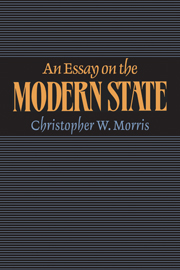6 - Justice
Published online by Cambridge University Press: 05 June 2012
Summary
Remota iustitia, quid sunt regna nisi magna latrocinia?
–AugustineMORAL JUSTIFICATION
Broadly, to justify something is to show it to be just or right or to be reasonable. To show we have reasons to obey and support a state might provide a rational justification. I have argued that it is unlikely that many states are such as to provide virtually all subjects with reasons to obey virtually all laws, even if we take sanctions to provide reasons of the relevant sort (and I defend this again in Chapter 7). Perhaps states that do offer most subjects reasons may nevertheless be tyrannical or capable of committing various evils. It is unclear, therefore, that rational justification is the sort we should seek. It would seem that some species of moral justification is what is needed.
One motive for rational justification is the conviction that the degree (or the nature) of modern moral disagreement would vitiate moral justification. Accordingly, we should want states to provide authoritative norms and decisions in the absence of moral agreement. I return to this idea in the next chapter and interpret it differently than I did in Chapter 5. For now, I assume that it is possible for a state to be evil and yet to be rationally justified. Even if there is considerable moral disagreement in modern times, sufficiently impressive for us to be skeptical of the power of much moral justification, it need not be the case that we should wish to eschew all moral justification.
- Type
- Chapter
- Information
- An Essay on the Modern State , pp. 136 - 171Publisher: Cambridge University PressPrint publication year: 1998



